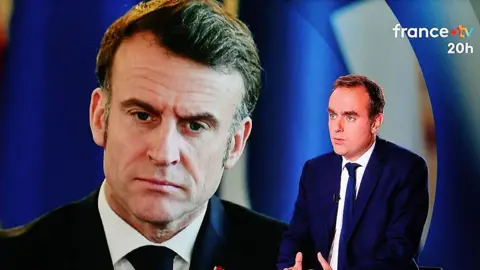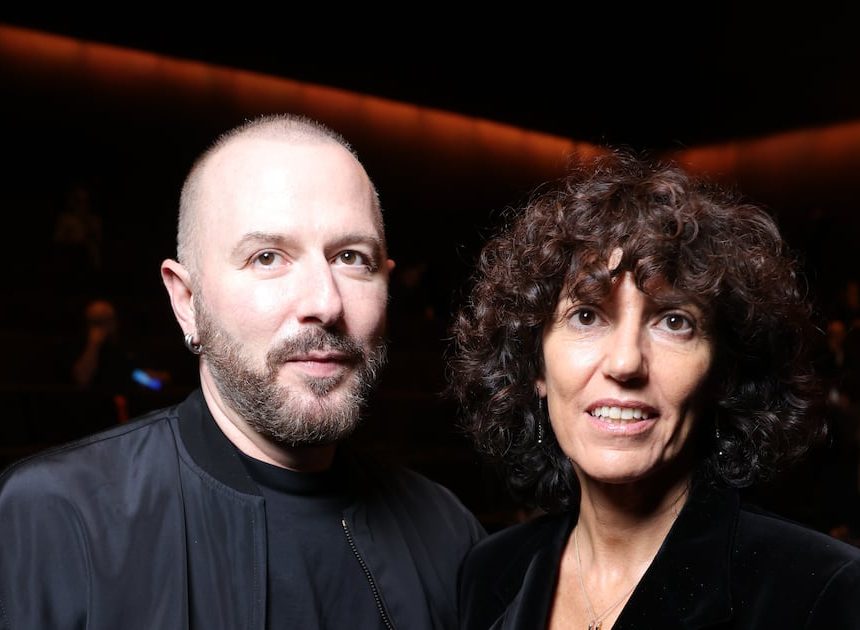Paul KirbyEurope digital editor
 AFP
AFPPresident Emmanuel Macron has asked Sébastien Lecornu to return as French prime minister only four days after he stood down from the post, sparking a week of high drama and political turmoil.
Macron made the announcement late on Friday, hours after meeting all the main parties together at the Élysée Palace, except the leaders of the far right and far left.
Lecornu’s return came as a surprise, as he said on national TV only two days ago he was not “chasing the job” and his “mission is over”.
It is not even certain he will be able to form a government, but he will have to hit the ground running. The new prime minister faces a deadline on Monday to put next year’s budget before parliament.
The Élysée said the president had “tasked [Lecornu] with forming a government” and Macron’s entourage indicated he had been given “carte blanche” to act.
Lecornu, who is 39 and one of Macron’s most loyal allies, then released a long statement on X in which he accepted “out of duty the mission entrusted to me by the president, to do everything to provide France with a budget by the end of the year and respond to the everyday problems of our compatriots”.
When he appeared on French TV this week, Lecornu described himself as a “soldier-monk”, and as he prepared to get to grips with forming a government he said on Friday “I will do everything to succeed in this mission”.
Political divisions over how to bring down France’s national debt and cut the budget deficit have led to the fall of two of the past three prime ministers in the last year, so his challenge is immense.
France’s public debt earlier this year was almost 114% of economic output (GDP) – the third highest in the eurozone – and this year’s budget deficit is projected to hit 5.4% of GDP.
Among the conditions Lecornu listed for taking on the job, one was that “no-one will be able to shirk” the necessity of restoring France’s public finances. With only 18 months before the end of Macron’s presidency, he also warned that anyone joining his government would have to put on hold their presidential ambitions.
What makes it even harder for Lecornu is that he will face a vote of confidence in a National Assembly where Macron has no majority to support him. The president’s popularity hit a record low this week, according to an Elabe poll that put his approval rating on 14%.
Jordan Bardella of the far-right National Rally, which was not invited to Macron’s talks with party leaders on Friday, said that Lecornu’s reappointment was a “bad joke”,from a president “more than ever isolated and disconnected at the Élysée”.
Bardella said his party would immediately bring a vote of no confidence against a doomed coalition, whose only reason for being was fear of an election.
Lecornu at least knows the pitfalls ahead as he tries to form a government, because he has already spent two days this week talking to parties that might join his government.
He was first appointed prime minister on 9 September and spent the next three weeks putting together a government, only for it to fall apart overnight when the the leader of the conservative Republicans, Bruno Retailleau, criticised one of the ministers.
By themselves, the centrist parties cannot form a government, and there are splits within the conservative Republicans who have helped prop up Macron’s governments since he lost his majority in elections last year. Retailleau, who is known to have presidential ambitions, has made clear he will not be part of Lecornu II.
So the centrist prime minister will also look to left-wing parties for potential support.
In an attempt to court the left, Macron’s team indicated the president was considering a delay to part of his highly contentious pension reforms passed in 2023 which raised the retirement age from 62 to 64.
That fell short of what left-wing leaders wanted, as they were hoping he would choose a prime minister from their side. Olivier Faure of the Socialists said “since we’ve not been given any guarantees, we won’t give any guarantee [to back the prime minister] in a vote of confidence”.
Fabien Roussel from the Communists said after meeting the president that the left wanted real change, and a prime minister from the president’s centrist camp would not be accepted by the French people.
Greens leader Marine Tondelier said she was “stunned” Macron had offered the left almost nothing, adding that “all of this is going to turn out very badly”.



